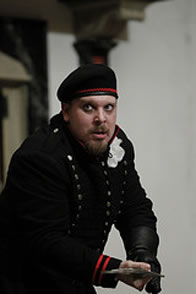A Conversation with King Richard III and Queen Margaret
[Return to previous page]
In Part Two, you had that great departure after the wonderful killing of Somerset. When everybody's leaving the stage, you pause and you look at the audience, and here is Richard III—this is the first time we see Richard III. I felt from listening to you do your speeches in Part Three that you saw the throne as the only heaven on Earth. That's the only place you could be free, that you could be what you wanted to be without the deformities, being the third brother, anything that was holding you back, it was the throne that was the be-all, catch-all of this life.

Richard (Benjamin Curns) in Henry VI, Part Three. Photo by Tommy Thompson, American Shakespeare Center.
BEN: Yeah. He turns the crown and the throne into this obsession. My feeling on Richard is that he's a profoundly unhappy person and that he has convinced himself that if he can be king he will be well liked and well loved by many people, and people will feel good about him, and by proxy he will finally feel good about himself. My opinion has always been that, along with all the money and influence and everything else that comes with it, if he could wear that crown, then people would like him. And it's not true. And I think from Act IV, Scene Two, the first time we see the crown on him, Shakespeare wastes no time in having everything start to fall apart. All his supporters, in his first scene as king, they all start questioning his orders, and they never had before. They're all questioning his decisions, and he's like, “What? Why is everybody against me all of a sudden?” He becomes increasingly cut off, and he's finding that the throne hasn't gotten him any more friends, it's only made him lots more enemies—in the case of Richmond, armed enemies.
He kind of loses his touch with Elizabeth. He doesn't successfully woo Elizabeth.
BEN: No. But she's smart enough to make him think that he did.
SARAH: Well, she's taken a while to get to that point, too. But she's learned. She's at a point where she's lost her sons and she's lost her husband. I think at the beginning of that play she knows what Richard is capable of, or at least is fearful of it. And then it actually all comes true. So I do think she is at least afraid enough and has gotten smart enough.
Is it significant that that wooing scene comes right after you teaching her how to curse.
SARAH: Yeah, I think it is. What I also think is interesting is that she tries to walk away from that scene [with Richard]. The Duchess of York has this great speech about how horrible Richard was as a child and she walks off. And then Elizabeth says, “I say amen to her” and that's going to be it, and he goes, “Whoa whoa whoa, wait a minute.”
BEN: Stay.
SARAH: And she says, “I have no more sons of the royal blood for you to slaughter,” something like that, and that begins it. But she tries to walk away, and I do think it's very important it comes right after we've seen Margaret—and we see Margaret, but Richard hasn't. That's a scene with all of these women that have lost everything, and then Margaret walks away and she says, “Yeah, you'll figure it out.”
So you kind of pass the baton on to her, and now she—
SARAH: Yeah, and she even says it. Margaret says it. In that scene she also lets it go. She lets her power go. She says, “Now thy proud neck bears half my burdened yoke from which even now I slip my weary neck and leave the burden of it all on thee.” She says, it's your turn now. That's what she says to Queen Elizabeth, who's no longer queen at that point, but she says, “Now I'm done. Thou didst usurp my place, and dost thou now usurp the just proportion of my sorrow.” She stayed, she watched all of this happening, and she says “These English woes will make me smile in France.” She passes off that baton, she says, “Here you go. You've been bearing half of the yoke, now you get it all.”
BEN: It's great because Margaret says, “Don't ever forget those kids. If you want your curses to have power, that's where they're going to come from. Never forget that you had two wonderful children and that toad took them from you.”
SARAH: “And imagine that they were fairer or sweeter than they were, and imagine that he is worse than he is, and that will teach you.”
BEN: And Elizabeth listens, too.
SARAH: Yes she does.
BEN: Because in that wooing scene, she brings up the kids so many times that Richard even says—
In fact it's the first thing she says.
BEN: Yes. But she brings it up so many times that Richard says, "Enough." But it's exactly what Margaret told her to do. Never forget them. Always bring them up. Never let him forget what he did. The murder of those kids, in the dramatic structure of the play, and the attempted marriage with the young Elizabeth are things that even Richard's friends can't get behind.
SARAH: It's the first thing that gives Buckingham pause.
BEN: It's gone from political intrigue and maneuvering and cloak and dagger to, like, "That's monstrous you're talking about."
Even historically, however good a king the real Richard was, and there's records that he balanced the budget and he did a lot of good stuff, he's never gotten past the disappearance of the two princes.
SARAH: Yeah. Don't kill babies.
Even Twizzler-eating ones.
SARAH: Yeah, that's true. We don't make it very hard for Ben to want to kill us. [Laughter]
BEN: You could have done it however you wanted, I was going to kill you anyway. [Laughs]
I had never picked up this interrelationship between Margaret and Elizabeth, this triangle of those two scenes. Maybe I'm beating a dead horse, but how much does that come back to you guys going through the whole arc of the histories? Or do you think that scene would still come off as well without the previous plays?
SARAH: I think that scene is just really well written. If you're playing Elizabeth, that's a great scene, really one of the best scenes that you get to do. There's so much word play and so much back and forth with this man. I think she's been pretty terrified of what he could do, has done, and then it's all gone.
But the Margaret scene, as you've pointed out, a lot of times is cut.
SARAH: I think that Elizabeth scene would still be powerful, but I think it's much more powerful if it comes straight on the heels of seeing what Margaret has told her. So, as part of the arc, I think it's always better if you have the history there.
BEN: I think all of these parts are enhanced by having done it in the prequels, Elizabeth included, simply because King Edward becomes so enamored with her that he stops listening to everyone. He puts all of his chips in with her. And she comes into the castle and she brings her whole family with her. Her only ally in court is Edward. So, for her to have Edward die as early as Act Two, Scene Two, she's really alone. She had the most powerful man in the country on her side and on her family's side, but as soon as he's gone everyone is united against her. I mean, Margaret even says, "You guys all hated each other until I got here. And then the only thing you have in common is that you all hate me more than you hate each other."
SARAH: But Elizabeth's story is not that much different from the Margaret story. She comes into court where no one wants her. It's really interesting that their beginnings in court are not that different. Except for the fact that Elizabeth is not foreign.
BEN: But she is common.
SARAH: She is common. But she's not French. So if you're going to choose in Shakespeare's play whether to be common or French, choose common.
BEN: Yeah, but we didn't have to give up giant chunks of our own real estate to have Elizabeth.
You're still pissed about that two years later, aren't you?
BEN: A little bit. [Sarah laughs] Anjou and Maine, my dad fought for those lands, those were supposed to be his. “Lets the paper fall,” I think is the stage direction in Henry VI, Two. Humphry is reading the terms and he just lets the paper fall. “I really can't read anymore.”
[To continue the interview, click here] [For a PDF of this interview, click here]



 Find additional Shakespeareances
Find additional Shakespeareances